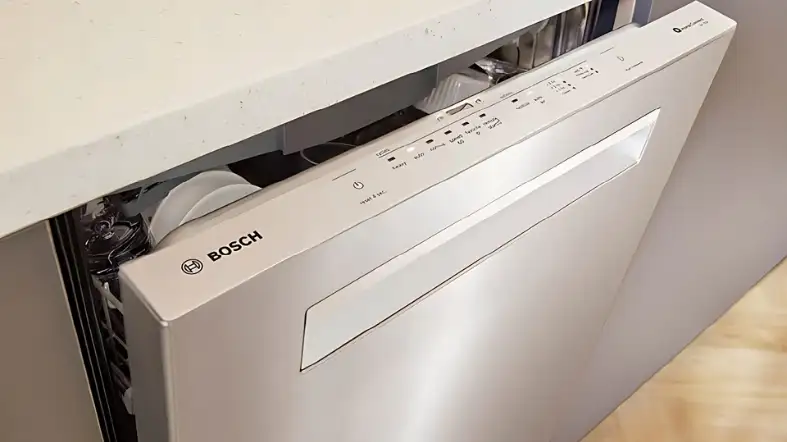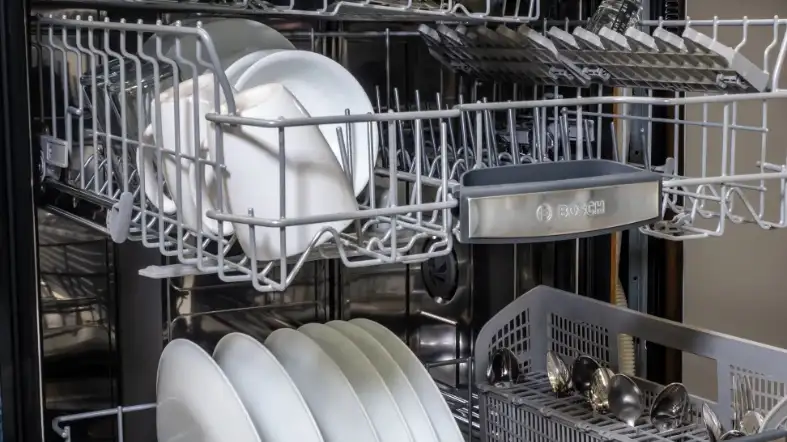Bosch Dishwasher Auto Vs Normal Cycle
Looking to make dishwashing a breeze with your Bosch dishwasher? Wonder what the difference is between Bosch dishwashers’ Auto and Normal cycles?
In this quick, data-backed guide, we’ll shed light on the distinct features of each cycle. We’re going to decode your dishwasher together, grab a seat!”

The Difference Between a Bosch Dishwasher’s Auto and Normal Cycles
The Auto Cycle
Temperature Variation
Dishwashers with Bosch Auto Cycle automatically adjust the temperature based on the degree of dirtiness.
This adaptive technology ensures that your dishes are always cleaned at the optimal temperature. It reduces the chances of spots or leftover grime.
Different types of dishes are cleaned efficiently and effectively using temperature variation.
Water Usage:
Adaptive Auto Cycles adjust the amount of water used based on the load and dirtiness of the wash.
Water saving features reduce water waste and benefit the environment at the same time. You can have peace of mind knowing that you’re contributing to water conservation.
Energy Efficiency:
The Auto Cycle is designed with energy efficiency in mind. Adapting to the level of dirtiness of the dishes can reduce unnecessary energy consumption.
You can lower your energy bills while keeping your dishes sparkling clean with this eco-friendly approach.
Versatility:
The Auto Cycle can handle a wide variety of dish types and levels of soiling. The Auto Cycle adjusts its settings for effective cleaning, no matter how lightly soiled the glass is.
This versatility ensures that all your dishes come out spotlessly clean, regardless of their condition.
The Normal Cycle

Set Temperature:
The Normal Cycle operates at a fixed temperature, maintaining the same level of heat throughout. This temperature setting is designed to work best for everyday dishes that are not heavily soiled.
Your dishwashing routine will be reliable and steady with the Normal Cycle’s consistent heat. With this fixed temperature, you can clean regular loads of plates, glasses, and cutlery.
Adaptive temperatures may be more effective on heavily soiled dishes with stubborn stains and grime.
Water Consumption:
Normal Cycle dishwashers consume a fixed amount of water per wash, regardless of size or dirtiness. While this ensures a thorough rinse, it may result in higher water usage than the Auto Cycle.
When washing large or heavily soiled loads, the fixed water consumption may be ideal for smaller loads. Auto Cycle’s adaptive water usage might appeal to those concerned with water conservation.
Energy Efficient:
Compared to the Auto Cycle, the Normal Cycle is less energy-efficient. Because the dishwasher has a fixed duration and temperature, it does not adjust its energy consumption.
For lightly soiled loads, the Normal Cycle may consume more energy than needed. In addition to its adaptive technology, the Auto Cycle uses less energy based on dish dirtiness.
Versatility:
If your dishes are heavily soiled or baked on dirt, the Normal Cycle may not be as effective. The Normal Cycle may not be as effective for dishes with tougher stains, such as baked-on food or grease.
It might be necessary to pre-rinse or soak the dishes before running the Normal Cycle in such cases.
Comparative Points
Effectiveness:
For heavy-duty cleaning, the Auto Cycle proves to be more effective than the Manual Cycle. Its adaptive nature is the key to its success.
Auto Cycle detects the level of dirtiness on the dishes and adjusts its settings accordingly. This means that even the toughest stains and dirt are no match for the Auto Cycle’s precision cleaning.
Your dishes will remain sparkling clean and spotless no matter what type of food you put on them.
Efficiency:
When it comes to efficiency, the Auto Cycle outshines the Normal Cycle in multiple ways. First, it’s energy-efficient.
It automatically adjusts its power usage based on the dirtiness of the load, reducing your energy bills. Second, it excels in water usage efficiency.
Auto Cycle automatically adjusts water use based on load dirtiness, potentially saving water. You can reduce your ecological footprint with the Auto Cycle if you are environmentally conscious.
User Control:
The Normal Cycle might be more appealing for those who like control and predictability. With the Normal Cycle, you can expect consistent performance with each wash.
A fixed temperature and set duration ensure a structured and predictable dishwashing experience. A straightforward and no-nonsense approach to dishwashing can be found in the Normal Cycle.
Convenience:
When it comes to convenience, the Auto Cycle takes the lead. Its adaptive technology eliminates the need for manual adjustments.
With the Auto Cycle, you don’t have to worry about choosing the right temperature or duration.
Simply load the dishwasher, press start, and let the smart sensors work their magic. Your dishwashing routine will be much more convenient and effortless with less guesswork.
Suitability:
The suitability of each cycle depends on your specific dishwashing needs. The Normal Cycle is well-suited for routine tasks and moderately soiled loads.
It’s ideal for everyday dishes that don’t have heavy grime or stubborn stains. In contrast, the Auto Cycle excels in its versatility.
It can handle a wide variety of dishes and dirt levels. As a result, the Auto Cycle adjusts its settings based on the condition of your glassware or baking dishes.
This makes the Auto Cycle a versatile and adaptable choice for various dishwashing needs.
Which wash cycle should I choose for my Bosch dishwasher?

There are a few factors to consider when choosing the right wash cycle for your Bosch dishwasher:
1. Load Size and Dirtiness:
Take a look at the dishes you have in your load. The Auto Cycle’s adaptive technology will provide thorough cleaning for heavily soiled dishes with tough stains.
If your load consists mostly of lightly soiled dishes, the Normal Cycle may be sufficient for your needs.
2. Energy and Water Efficiency:
Consider your priorities when it comes to energy and water conservation. Its energy-saving features make it a more eco-friendly choice for reducing your ecological footprint.
Normal Cycle, on the other hand, can still provide reliable cleaning if resource usage isn’t a concern.
3. Time and Convenience:
Think about how much time and effort you want to invest in your dishwashing routine. It automatically adjusts its settings based on the load’s dirtiness, eliminating the need to adjust manually.
This cycle has a fixed duration and temperature, making it more straightforward and predictable.
4. Dish Variety and Grime Levels:
Consider the types of dishes you frequently wash. In addition to handling various dirt levels, the Auto Cycle also works well with heavy soiled pots and pans.
If you primarily wash routine dishes and glasses, the Normal Cycle’s fixed parameters may be sufficient.
5. Environmental Impact:
Those who prioritize environmental sustainability will appreciate AutoCycle’s energy and water efficiency.
Choosing the Auto Cycle contributes to reducing your carbon footprint and conserving resources.
The duration of Bosch dishwasher cycles? Auto vs. normal cycles
Here are the details that distinguish each cycle’s duration:
Auto Cycle Duration:
Adaptive Technology:
The Auto Cycle’s duration varies based on the load’s dirtiness. In the dishwasher, advanced sensors detect the level of grime on the dishes and adjust the wash time.
For heavily soiled dishes, the Auto Cycle may run for a longer duration to ensure thorough cleaning. Lightly soiled loads might result in a shorter cycle time, saving energy and water.
Comprehensive Cleaning:
Because of its adaptability, the Auto Cycle cleans all dishes effectively regardless of their dirtiness.
We guarantee spotless dishes free of grime and stains with our tailored approach.
Customized Wash:
Designed to accommodate all types of dishwashing, the Auto Cycle has a varying duration.
You can adjust the Auto Cycle duration depending on how much soil is present in your load. It provides the perfect wash for each situation.
Normal Cycle Duration:
Fixed Duration:
The Normal Cycle, in contrast to the Auto Cycle, runs for a fixed duration every time you select it. It does not adjust its wash time based on the load’s dirtiness.
No matter how heavily stained or lightly soiled your dishes are, the Normal Cycle will always run.
Consistent Performance:
The fixed duration of the Normal Cycle ensures predictable results with each wash.
It performs consistently and reliably, making it ideal for dishwashing tasks with moderate soiling.
Time Management:
A normal Cycle is convenient for those who prefer a structured routine with a set wash time.
As you know exactly how long the cycle will take, you can plan your schedule better.
FAQs About Bosch Dishwasher Auto vs. Normal Cycle
Are There Situations Where I Should Use The Normal Cycle Instead Of The Auto One?
The Normal cycle is best used for dishes that are soiled and don’t have any dried or baked-on food.
If your dishwasher load matches this description, the Normal cycle will suffice.
Is It Advisable To Use The Auto Cycle For Heavily Soiled Dishes?
Yes, the Auto cycle is designed to handle a variety of dish soil levels, including heavy soil.
The sensors will adjust the cleaning process to tackle even the toughest stains and dried-on food.
Will The Frequent Use Of The Auto Cycle Affect The Lifespan Of My Bosch Dishwasher?
No, frequently using the Auto cycle will not adversely affect the lifespan of your Bosch dishwasher.
You can rest assured your dishwasher will operate efficiently without extra wear and tear with this product.
Conclusion
Making the right choice between the Bosch dishwasher’s Auto and Normal cycles can seem complex.
Remember, Auto adjusts to dish dirtiness, often saving energy and guaranteeing a thorough clean. Meanwhile, Normal shines for standard soiling.
Your dishwasher is designed to handle both, ensuring sparkling dishes every wash. Make the smart choice based on your load – it’s all about efficient cleaning.
